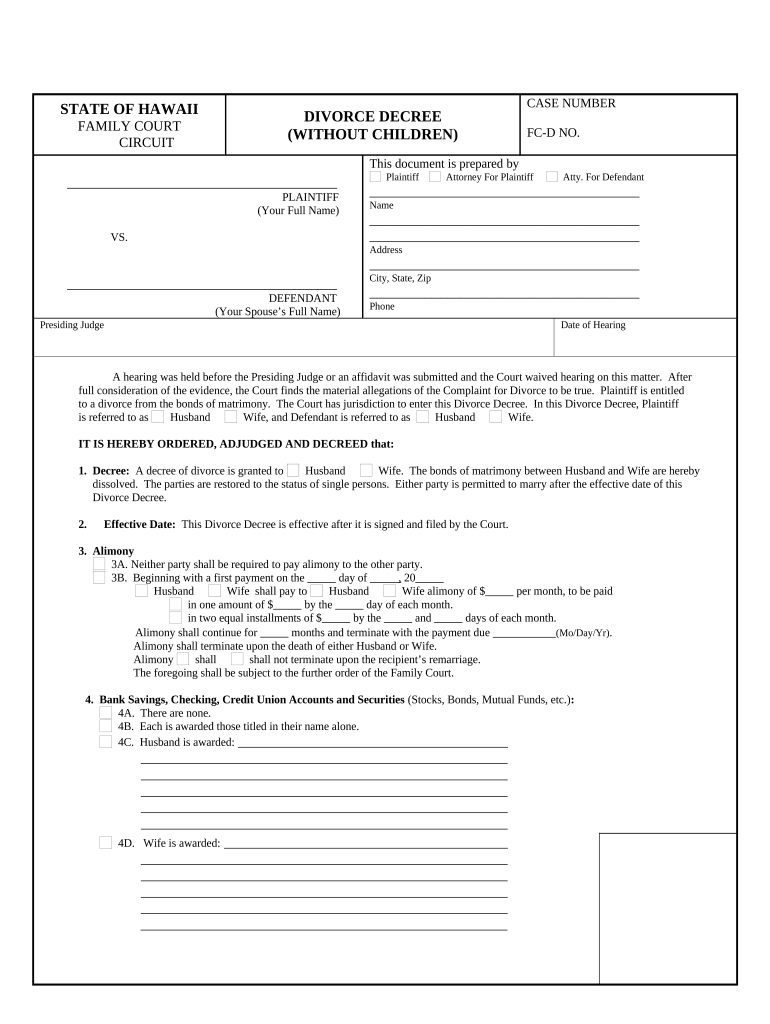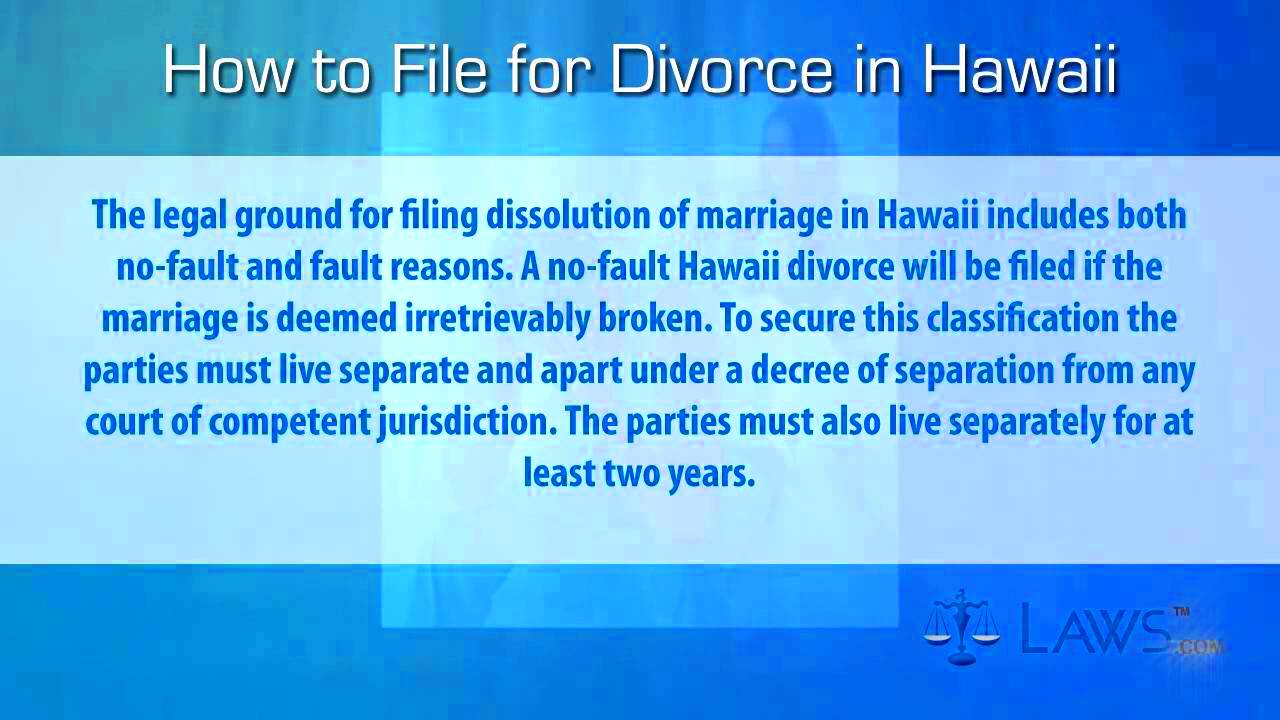Overview of Hawaii Divorce Laws
Going through a divorce can be tough and filled with emotions, especially when dealing with the legal aspects. Hawaii, with its stunning scenery and rich culture has its own divorce laws that showcase a unique take on family matters. As I’ve delved into these regulations I’ve discovered that Hawaii’s legal system strikes a balance between providing support for individuals during their separation. Whether you’re a long time resident or someone who has recently relocated to this island paradise understanding these laws is essential for a smoother divorce journey.
Residency Requirements for Divorce

In order to file for divorce in Hawaii you have to fulfill specific residency criteria. Here’s a summary of the key points you should be aware of.
- Residency Duration: At least one of the spouses must have lived in Hawaii for at least six months before filing for divorce.
- State Residency: You need to be a resident of the state at the time of filing, which means either you or your spouse must be a resident of Hawaii.
- Military Personnel: Special rules apply to military personnel. If you or your spouse is stationed in Hawaii, this residency requirement can be fulfilled differently.
Based on my personal experience navigating residency matters can be an extra challenge. However once you have a good understanding of the requirements moving ahead becomes a lot smoother.
Types of Divorce Available in Hawaii

Hawaii provides options when it comes to divorce tailored to various situations. Knowing these choices can assist you in selecting the approach for your specific circumstances.
- Contested Divorce: This occurs when spouses cannot agree on one or more key issues, such as property division or child custody. It usually requires a trial and can be time-consuming and emotionally draining.
- Uncontested Divorce: If both parties agree on all aspects of the divorce, including division of assets and child custody, this type of divorce can be resolved more quickly. It’s generally less stressful and more straightforward.
- Summary Divorce: Available for couples without children and with minimal assets. This streamlined process is quicker and less complex, designed for those with simple cases.
I believe that the kind of divorce you go for can have an impact on how you feel about it. If you can swing it an uncontested divorce can really smooth things out and make the whole ordeal less stressful.
Grounds for Divorce in Hawaii

Going through a divorce can be really challenging and emotionally draining. Knowing the reasons for divorce in Hawaii can help smooth the way. In Hawaii you can get a divorce for both fault and no fault reasons. Based on my experiences with family matters I’ve realized that being aware of these grounds assists in making choices during this tough period.
- No-Fault Grounds: This is the most common ground for divorce in Hawaii. It simply means that the marriage is “irretrievably broken.” Neither party needs to prove fault or assign blame, making it a less confrontational option.
- Fault Grounds: While less common, fault-based divorces are available. These include:
- Adultery: If one spouse has committed adultery, it can be grounds for divorce.
- Extreme Cruelty: This includes physical or emotional abuse that makes the marriage unbearable.
- Abandonment: If one spouse has left the other without consent and stayed away for a prolonged period, it might be grounds for divorce.
In my opinion no fault divorces tend to be the simplest and least distressing option particularly when both individuals are in agreement about parting ways on good terms.
Division of Property and Assets
Dividing up property and assets in a divorce can be a real bone of contention. Hawaii sticks to the concept of “distribution” when it comes to asset division. This means that while the division is fair it’s not always split down the middle. Let’s take a closer look at how this process unfolds;
- Community Property: In Hawaii, property acquired during the marriage is considered community property. This includes income, real estate, and other assets.
- Separate Property: Property owned before the marriage or acquired through inheritance is typically considered separate and not subject to division.
- Factors Considered: When dividing property, the court considers several factors, such as:
- Duration of Marriage: Longer marriages might result in more equal divisions.
- Contribution to the Marriage: Non-financial contributions, like homemaking, are also considered.
- Economic Circumstances: The court looks at each spouse’s financial situation to ensure a fair distribution.
From what Ive seen keeping things documented and communicating openly with your partner can make this transition smoother. The goal of splitting things up is to make sure both individuals can begin their new chapters in life with a strong foundation.
Spousal Support and Alimony
Alimony, often referred to as support is intended to help a spouse who earns less or doesn’t work financially. In Hawaii alimony isn’t given but can be granted based on certain factors. Here’s what you should be aware of.
- Types of Alimony: Hawaii recognizes different forms of spousal support:
- Temporary Alimony: Paid during the divorce proceedings to help the lower-earning spouse maintain their standard of living.
- Rehabilitative Alimony: Provided to support a spouse while they gain education or training to become self-sufficient.
- Permanent Alimony: Less common, this is awarded in cases where the recipient is unlikely to become self-supporting due to age or disability.
- Factors Influencing Alimony: Courts consider several factors when determining alimony, including:
- Length of Marriage: Longer marriages might result in longer or more substantial alimony.
- Financial Needs and Abilities: The recipient’s financial needs and the paying spouse’s ability to provide support are assessed.
- Standard of Living: The goal is to maintain a standard of living similar to what was enjoyed during the marriage.
Based on what I’ve seen discussing support can be a topic. Its crucial to tackle it with an attitude taking into account the needs and contributions of both individuals involved. Honest dialogue and compromise can frequently result in a resolution.
Child Custody and Support
When parents choose to part ways one of the most challenging and sensitive issues to navigate is child custody and support. Based on my observations I’ve witnessed the profound impact this can have on all parties concerned. In Hawaii the focus is on prioritizing the child’s best interests while also promoting fairness, for both parents. Let’s take a look at what you can anticipate in this process.
- Types of Custody: In Hawaii, custody can be categorized as:
- Legal Custody: This involves the right to make important decisions about the child’s life, such as education and healthcare.
- Physical Custody: Refers to where the child will live and who will provide day-to-day care.
- Custody Arrangements: The court strives to create a custody arrangement that serves the best interest of the child. This might involve:
- Joint Custody: Both parents share responsibilities and decision-making.
- Sole Custody: One parent has primary responsibility, while the other might have visitation rights.
- Child Support: Child support is determined based on several factors:
- Income of Both Parents: The court looks at each parent’s earnings to determine support amounts.
- Needs of the Child: This includes expenses for education, healthcare, and other essentials.
- Existing Custody Arrangements: The amount of time each parent spends with the child can impact support calculations.
In my opinion prioritizing the needs of the child and keeping communication open between parents can help alleviate the stress during this difficult period.
Steps to File for Divorce
Going through a divorce can be a daunting experience, but if you break it down into steps it becomes easier to handle. From what I’ve seen here’s a simple roadmap to assist you on your journey:
- Step 1: Meet Residency Requirements: Ensure that you or your spouse meet the residency requirements in Hawaii, which is living in the state for at least six months.
- Step 2: Prepare Divorce Documents: Gather all necessary documents, including the divorce petition, financial statements, and any other required forms.
- Step 3: File the Petition: Submit your divorce petition to the Family Court in your county. Pay the filing fee or apply for a fee waiver if needed.
- Step 4: Serve the Papers: Officially notify your spouse by serving them with the divorce papers. This can be done by mail or in person.
- Step 5: Respond to the Petition: Your spouse will need to respond to the petition. If they agree, you can proceed with an uncontested divorce; if not, the process will be more complex.
- Step 6: Attend Court Hearings: Depending on your case, you may need to attend hearings. Be prepared to discuss and resolve issues related to property division, custody, and support.
- Step 7: Finalize the Divorce: Once all issues are resolved and the court is satisfied, a judge will finalize the divorce and issue a decree.
In my view keeping things in order and reaching out for legal counsel when necessary can help streamline this journey. Every move brings you nearer to a new beginning.
FAQ
Q1: How long does the divorce process take in Hawaii?
The time it takes to get divorced can differ based on whether both parties agree or not. If both spouses are on the same page an uncontested divorce could be wrapped up in just a few months. However if there are disagreements in a contested divorce it may stretch out over a year or even longer.
Q2: Can I get a divorce if my spouse lives outside Hawaii?
Yes, if you meet the residency requirements you can file for divorce in Hawaii. Your spouse doesn’t have to be a resident of Hawaii, but they must be properly notified about the divorce proceedings.
Q3: What if my spouse doesn’t agree to the divorce?
If your partner disagrees with the divorce it will be contested. This means youll have to navigate through legal processes such as court hearings to settle disputes over matters like dividing assets and child custody arrangements.
Q4: How is child support calculated in Hawaii?
Child support is determined using a calculation that takes into account the earnings of both parents, the requirements of the child and how much time the child spends with each parent. The aim is to ensure that the childs needs are adequately met in a fair manner.
Q5: Can spousal support be modified after the divorce is finalized?
Absolutely, spousal support can be adjusted if there is a substantial shift in circumstances like a change in income or job situation. To make this modification you would have to file a request with the court.
Conclusion
Going through a divorce can be tough but many people face it with strength and hope for a brighter tomorrow. Knowing the ins and outs of Hawaii’s divorce laws can give you the clarity and confidence to move on. Whether its residency rules, child custody matters or dividing assets each part of the process is tailored to fit your unique situation. In my view approaching this journey with patience, empathy and open communication can really make a difference. Don’t forget to seek guidance from lawyers and trusted advisors who can help you navigate the complexities of divorce while keeping your well being and your family’s well being in mind. As you move ahead remember that this challenging chapter is ultimately a step towards a fresh start.


